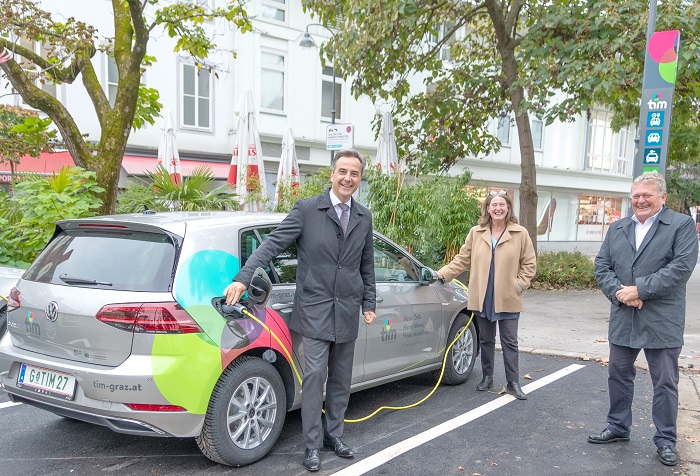New tim node at Eisernen Tor

At the new location, customers currently have access to an e-Golf, a fuel-operated vehicle and a rental car. The tim node at the Eisernen Tor is part of the REGIOtim regional project and has been supported as part of the IWB/EFRE 2014-2020 (Investments in Growth and Employment) programme with funds from the European Union and the regional department of the state of Styria.
More than 2,200 users and 45,000 bookings since tim first launched
Mayor Siegfried Nagl sees “electromobility in urban areas as a topic that has fascinated me as mayor since attending the first e-mobility conference in Graz in 2010.” Nagl continued: “With this project, we are also making alternative mobility options in Graz’s city centre more attractive.” Transport Councillor Elke Kahr said: “Carsharing has been very well received in Graz. tim fits into our transport concept as a complementary mobility service and will be expanded further.”
Holding Graz CEO Wolfgang Malik said: “There are currently 10 tim mobility nodes in Graz, and further nodes are being developed at Griesplatz (end of 2020), at Reininghaus (mid-2021), and at the Smart City (with the completion of the tram’s end of the line). Customers currently have access to 60 carsharing cars including rental cars and 45 e-taxis.” All the mobility nodes offer public charging stations and connect walking, cycling and public transport with alternatives to your own car, such as carsharing (e-cars too), rental cars and e-taxis. The cars offered as part of tim are not exclusively electric and, contrary to what is often assumed, can also be used beyond the greater Graz area. This way, tim also covers the traditional need for longer trips and can be used for weekend excursions or holidays. Seven tim nodes have e-taxi parking spaces and there is also a cargo bike at Schillerplatz, which will be free for tim members until March 2021. There are also five locations in the city of Graz that are exclusively for carsharing. To date, tim has recorded a total of 45,600 bookings, with e-carsharing cars covering around 800,000 km, which has saved about 128 tons of CO2.
(Photo: achtzigzehn/Hinterleitner)